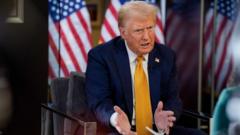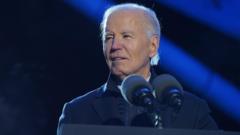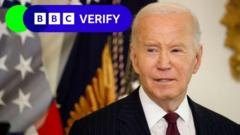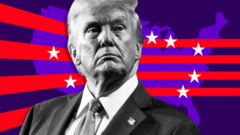Pew Research Center's findings reveal that nearly one in five Americans turn to social media influencers for news updates, with a pronounced preference among younger audiences. The shift suggests a growing discontent with traditional media's reliability and an increasing reliance on influencers for diverse perspectives.
Social Media Influencers Emerge as Key News Sources Amid Trust Crisis in Traditional Media

Social Media Influencers Emerge as Key News Sources Amid Trust Crisis in Traditional Media
A recent study finds that over 20% of Americans now rely on social media influencers for news, reflecting a significant shift in public trust from established news outlets.
A recent report by the Pew Research Center highlights a significant trend in how Americans consume news, indicating a growing reliance on social media influencers as trustworthy sources. According to the survey of over 10,000 U.S. adults, approximately 21% of respondents admit to regularly obtaining news from influencers on platforms such as X (formerly Twitter), YouTube, and TikTok. This trend is more pronounced among younger demographics, with 37% of adults aged 18 to 29 frequently seeking news from these figures.
The findings suggest an important shift in public trust away from traditional news outlets, which have faced severe critique for alleged bias, misinformation, and sensationalism. Influencers like Brian Tyler Cohen, Ben Shapiro, and Joe Rogan represent a range of political viewpoints, resonating with those who feel alienated by mainstream media narratives. During the previous presidential campaign, influencers were instrumental in shaping public discussions, as many opted for their direct and unfiltered content over conventional media coverage, often seen as flashy or exaggerated.
This shift may stem from the perception that traditional outlets have inadequately reported on crucial events or have been selective in their storytelling. Consequently, influencers have emerged as alternatives, offering fact-checks, expert insights, and a variety of perspectives that appeal to diverse audiences. The Pew report underscores influencers' growing role in making traditional media more accountable while providing audiences with perceived credible information.
However, this evolving landscape also introduces challenges. The transition from centralized to decentralized platforms places the onus of fact-checking onto individuals. While many influencers prioritize accurate reporting, the burden falls on audiences to discern credible information from sensationalized content.
The findings shed light on a broader sentiment of dissatisfaction with mainstream media’s reporting approach. As digital platforms continue to change the information landscape, influencers are steadily becoming key figures in empowering audiences to evaluate news critically. This shift challenges the long-standing superiority of traditional outlets, signaling a transformation in how news is disseminated and consumed in the modern age.




















